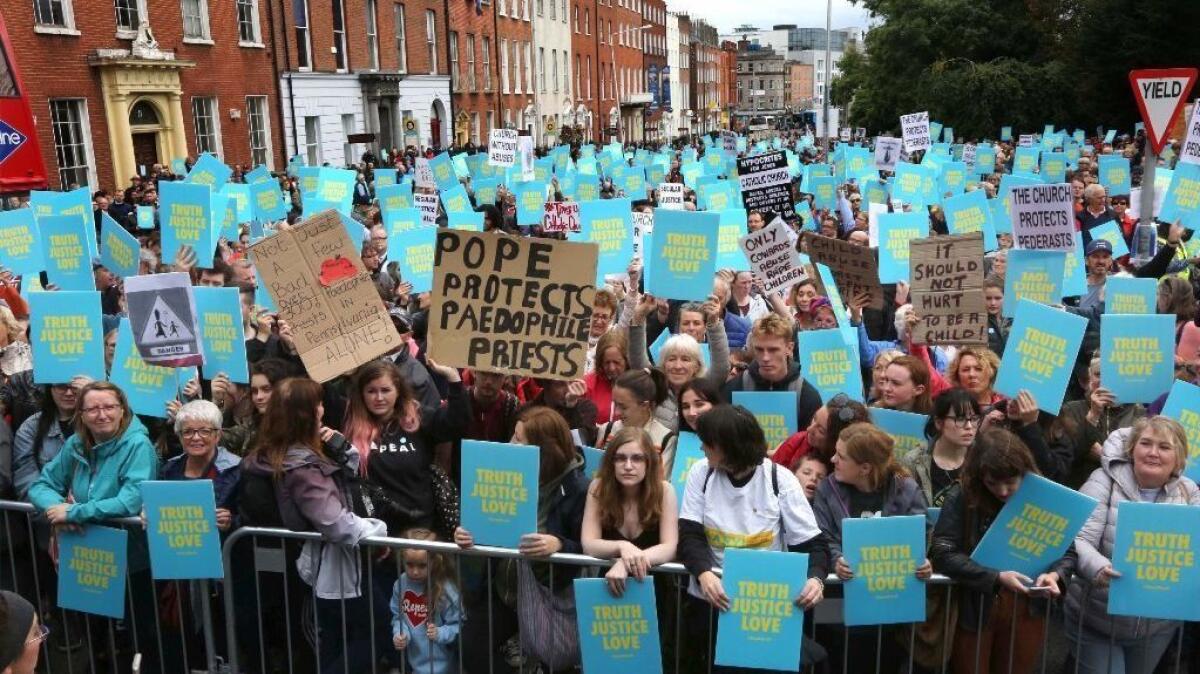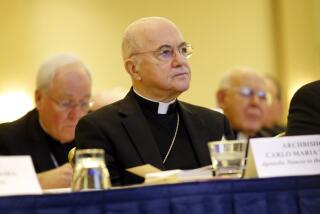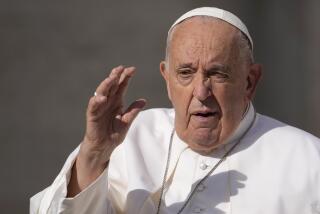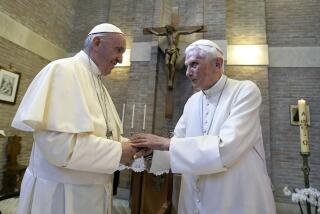Former Vatican envoy accuses Pope Francis of hiding sexual abuse allegations involving disgraced U.S. cardinal

Reporting from Washington — In a remarkable and scathing recrimination, the Vatican’s former ambassador to Washington accused Pope Francis and his predecessor Pope Benedict XVI on Sunday of knowingly hiding sexual abuse allegations involving a now-disgraced American cardinal, further convulsing a church in crisis.
The former envoy’s 11-page broadside rocked the Roman Catholic world as Francis finished a two-day visit to Ireland, where he faced demonstrations and begged forgiveness in the once-fervently Catholic country for the “scandal and betrayal” done by decades of clerical sex abuse, and an elaborate cover-up by church authorities.
In his letter, Archbishop Carlo Maria Vigano, who was papal nuncio, or ambassador, in Washington from 2011 to 2016, accused Francis and Benedict of being aware of and tolerating the transgressions of Cardinal Theodore McCarrick, the former archbishop in Washington, for years.
“Bishops and priests, abusing their authority, have committed horrendous crimes to the detriment of their faithful, minors, innocent victims, and young men eager to offer their lives to the Church,” Vigano wrote, “or by their silence have not prevented that such crimes continue to be perpetrated.”
He added: “Now that the corruption has reached the very top of the Church’s hierarchy, my conscience dictates that I reveal those truths.”
McCarrick resigned on July 28 after news reports disclosed that he had a 50-year history of sexual relations with male seminarians and young priests, some consensual, some forced. He also allegedly had attacked an 11-year-old altar boy. Francis stripped McCarrick of his title as cardinal, a rare punishment.
By accusing the church’s top leadership of being directly complicit in the cover-up of widespread sexual abuse, Vigano’s bombshell claims — which are still unproven — have raised the stakes sharply as Francis tries to regain trust of the world’s 1.2 billion Catholics.
Vigano, 77, is a controversial figure in the church and may have his own agenda. A longtime critic and political enemy of Francis, he was recalled from Washington two years ago amid allegations that he’d become embroiled in the U.S. political battle over same-sex marriage, which he bitterly opposed.
In his letter, he accused Francis and several senior prelates of a “pro-gay ideology” that tolerated homosexual priests. He also called on Francis to resign, a stunning demand in the staid, centuries-old institution that generally closes ranks around the Vatican.
Speaking to reporters on his flight home from Dublin late Sunday, Francis declined to comment on the letter, saying it “speaks for itself.” He said he would trust journalists to judge its veracity. The Vatican offered no other comment.
The letter, which was sent to conservative Catholic news sites, may have been timed to overshadow the pontiff’s “visit of reconciliation” to Ireland, a Catholic country where anger has mounted over growing reports of abuses by clergy.
Vigano accused the church leadership under Francis, the first pope from the Americas and a Jesuit, of having “favored promoting homosexuals into positions of responsibility.”
He said Francis initially attempted to “rehabilitate” McCarrick by relaxing penalties that Benedict had previously imposed on the cardinal for his misdeeds. Senior church leaders knew of McCarrick’s crimes as long ago as 2000, Vigano claimed.
Vigano also wrote that he told Francis in 2013, several months into his papacy, that the Vatican had a thick dossier on McCarrick, and that Benedict had ordered the cardinal to remove himself from public life several years earlier.
“He corrupted generations of seminarians and priests and Pope Benedict ordered him to withdraw to a life of prayer and penance,” Vigano said he told Francis. “The Pope did not make the slightest comment about those very grave words of mine and did not show any expression of surprise on his face, as if he had already known the matter for some time, and he immediately changed the subject.”
Vigano claimed that Francis, Benedict and McCarrick’s successor, Cardinal Donald Wuerl of Washington, all knew of the disgraced former cardinal’s sins but failed to act. Wuerl has said he was unaware of McCarrick’s misconduct.
Supporters of Francis cautioned that Vigano’s accusations echo complaints from the most conservative wing of the church against Francis, his efforts to promote reform, his priority for the poor and his demand that the Catholic faith be more inclusive — including for gays and women.
Michael Sean Winters, who writes about the intersection of politics and religion for the National Catholic Reporter, questioned why Vigano came forward now and said his accusations were presented without substantiation.
“Vigano is a disgruntled former employee,” Winters said. “But, make no mistake: This is a coordinated attack on Pope Francis. A putsch is afoot and if the U.S. bishops do not, as a body, stand up to defend the Holy Father in the next 24 hours, we shall be slipping towards schism…. The enemies of Francis have declared war.”
Austen Ivereigh, an expert on the church who has written a biography of Francis, called Vigano’s letter a “hit job.”
Since his selection as pontiff in 2013, replacing the staunchly conservative Benedict XVI, who became the first pope in modern times to resign, Francis has faced a backlash from traditionalists who feared a loss of strict doctrine as well as their power.
In October 2015, Vigano sparked controversy during the pope’s visit to Washington when he arranged a papal audience for Kim Davis, a former county clerk in Kentucky who defied a Supreme Court order and refused to issue marriage licenses to same-sex couples.
After conservative groups used the meeting to claim Francis opposed gay unions, the Vatican clarified that the pope had no idea who Davis was.
But coinciding with the right-wing mutiny, Francis — like his predecessors — has faced criticism that he bungled the handling of the abuse scandal and acted belatedly.
The decades of unpunished crimes, which Francis has called repugnant, has gravely eroded confidence in the church among Catholics, especially in the United States and once-fervently religious Ireland.
The convergence seems to have plunged the Catholic Church into its most devastating crisis in decades.
In a swing through his native South America in January, Francis enraged many when he said survivors of abuse were “slandering” a Chilean bishop whom they accused of protecting a notorious priest who had been found guilty by the Vatican of sex crimes.
Facing the backlash, Francis later apologized, and several Chilean prelates were forced to step down from their clerical positions. From then on, Francis took a more active role in confronting the sordid history.
But this month, more shame befell the church. Culminating a two-year investigation, a grand jury in Pennsylvania chronicled a ghastly half-century of rape and sexual assault by 301 “predator” priests with more than 1,000 victims, including boys as young as 7.
Even as Vigano’s letter was circulating, the pope begged for forgiveness in his final appearances Sunday in Ireland.
In an afternoon Mass in Dublin, the pope told tens of thousands of faithful that he wanted to see justice for those who “suffered abuse, were robbed of their innocence and left scarred by painful memories.”
The remarks, which appeared to depart from his prepared homily, repeated the themes of sin and forgiveness in the first papal visit to Ireland in nearly 40 years. Francis also met with eight survivors of abuse and, according to one, promised action.
As the pope left the country, Ireland’s Prime Minister Leo Varadkar said on Twitter that he welcomed the pope’s “call for firm and decisive action and for forgiveness,” adding a demand that “from words flow actions.”
Attendance at the Dublin Mass and a later ceremony in Knock, the site of a Marian shrine marking what the church certified was an 1879 apparition of the Virgin Mary, was lower than expected.
At rival events elsewhere in Ireland, several thousand protesters honored victims of church abuse. In addition to rapes and molestation by priests and occasionally nuns, Ireland also bore witness to decades of punishment and beatings of unmarried pregnant women and girls who were forced to relinquish their babies.
Mary Straffan who traveled an hour to the ceremony in Knock, said the pope’s visit could spark renewed interest in religion in a country where the once-mighty Catholic Church has shed much of its influence — in part because of the scandals.
“You can see there are a lot of young people here this morning, so maybe the visit will help,” she said.
For more on international affairs, follow @TracyKWilkinson on Twitter
Roughneen is a special correspondent.
More to Read
Sign up for Essential California
The most important California stories and recommendations in your inbox every morning.
You may occasionally receive promotional content from the Los Angeles Times.











